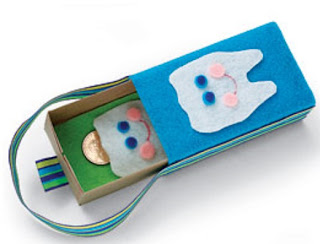 For your child, losing those baby teeth can be very exciting! They might ask you, "what do I do with my lost tooth?" Well, you simply place it under your pillow at night and when you are fast asleep the tooth fairy will come and whisk your tooth away leaving behind a special gift just for you! Here's a great craft project for you and your child from Disney that will make the tooth fairy’s job a little easier and give their tooth a special place to stay until it is taken away.
For your child, losing those baby teeth can be very exciting! They might ask you, "what do I do with my lost tooth?" Well, you simply place it under your pillow at night and when you are fast asleep the tooth fairy will come and whisk your tooth away leaving behind a special gift just for you! Here's a great craft project for you and your child from Disney that will make the tooth fairy’s job a little easier and give their tooth a special place to stay until it is taken away. Tooth Fairy “Tooth” Box
What you will need:
• 1 large empty match box
• Enough felt to wrap the box and inside sliding tray
• Ribbon
• Glue (tacky glue or a hot glue gun)
• Markers
• White, pink and blue (or your child's favorite color) felt for decorating the matchbox
• Scissors
Step 1: Pull the inner tray out of the box and line the inside with glue and felt as shown. Wrap the outside of the box with felt and glue it in place.
Step 2: Glue ribbon to the outside of the box in a hanging loop shape. Fold another piece of ribbon in half and glue it to the bottom of the inner tray to create a handle for sliding it in and out.
Step 3: Draw a tooth shape on paper, cut it out, and trace it onto the white felt twice. Cut out the teeth and face details.
Step 4: Decorate the teeth with the eyes and cheeks and draw on a mouth. Glue one tooth to the outside of the box.
Step 5: Create a tooth pocket by applying glue to the sides and bottom of the remaining tooth as shown, leaving an opening at the top. Glue the pocket to the inside tray. Once the glue dries, the box is Tooth Fairy-ready.





















